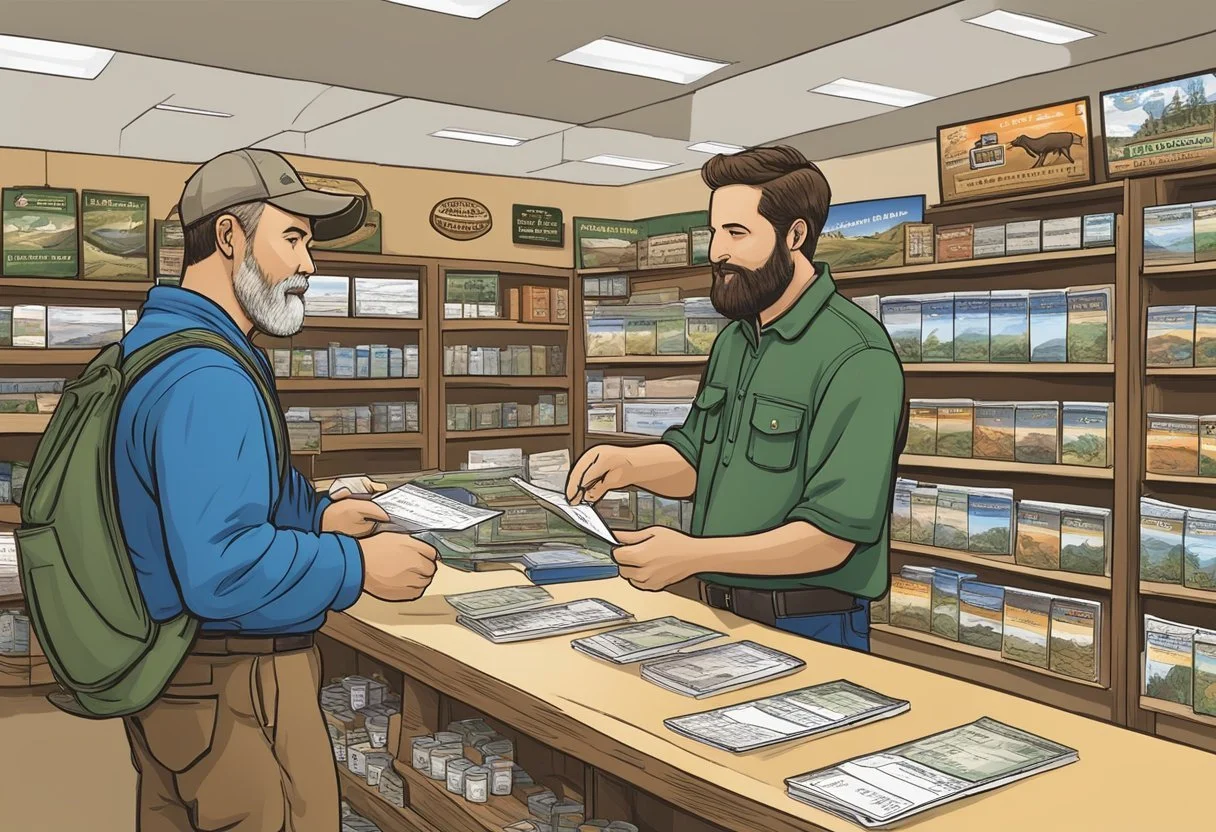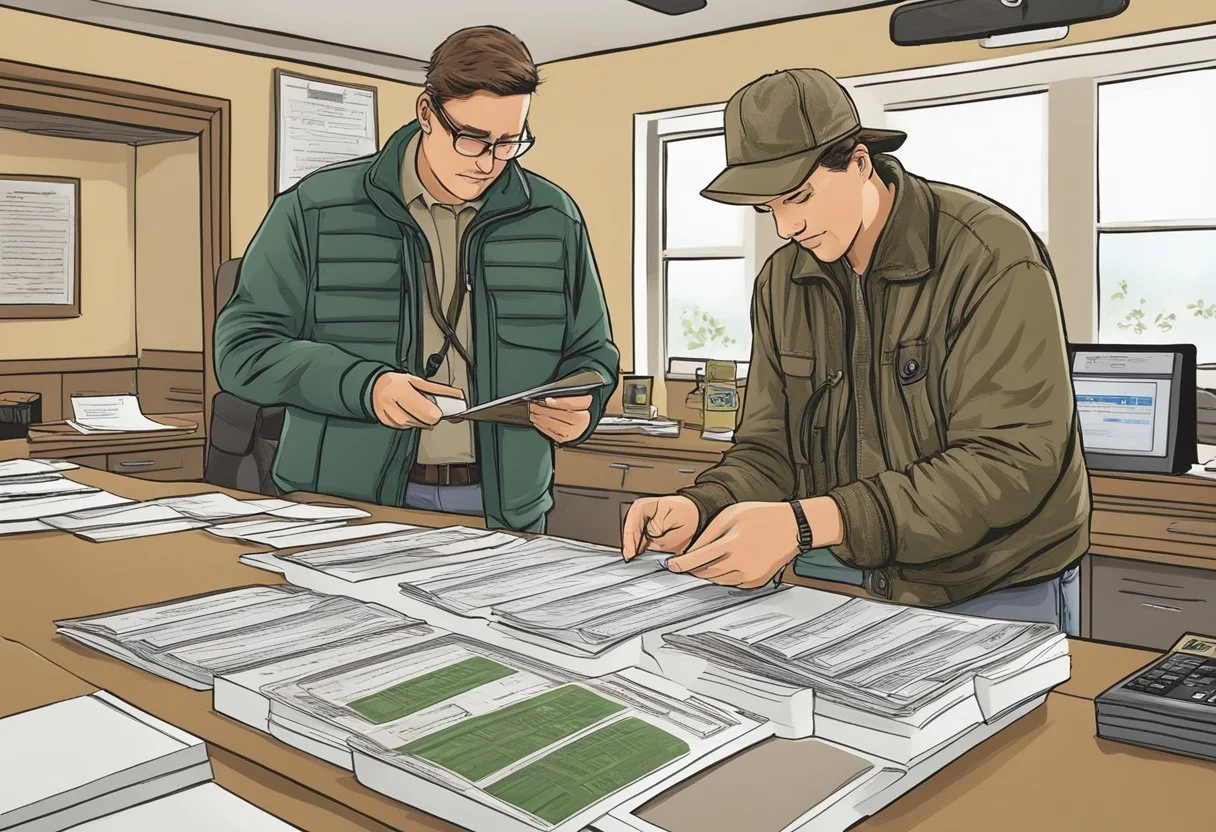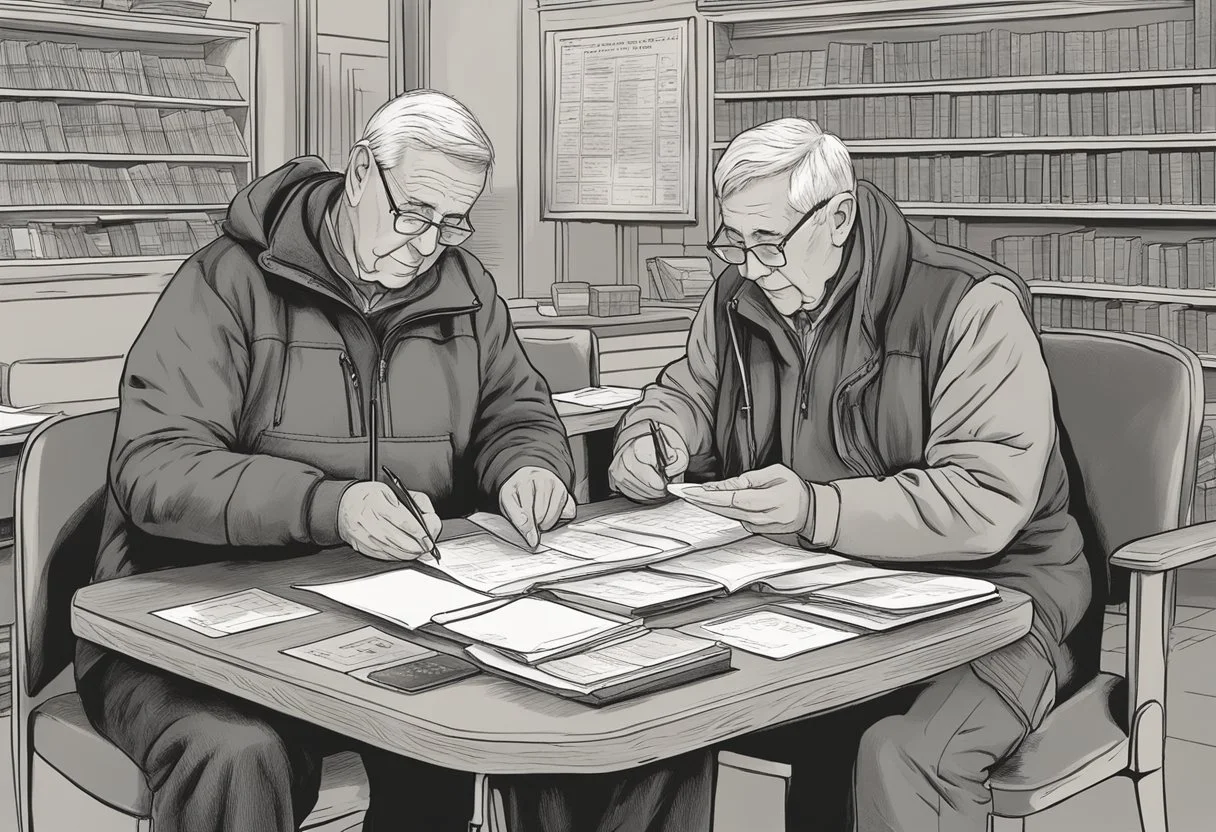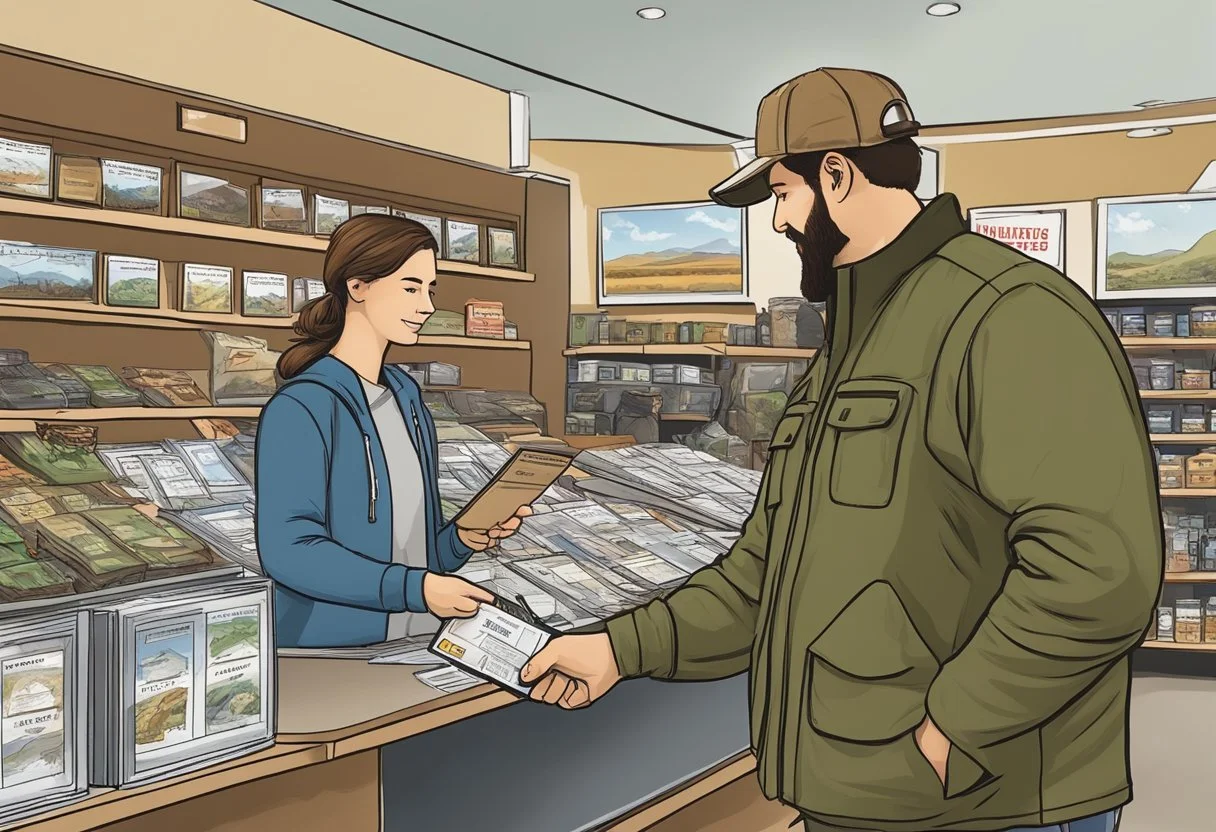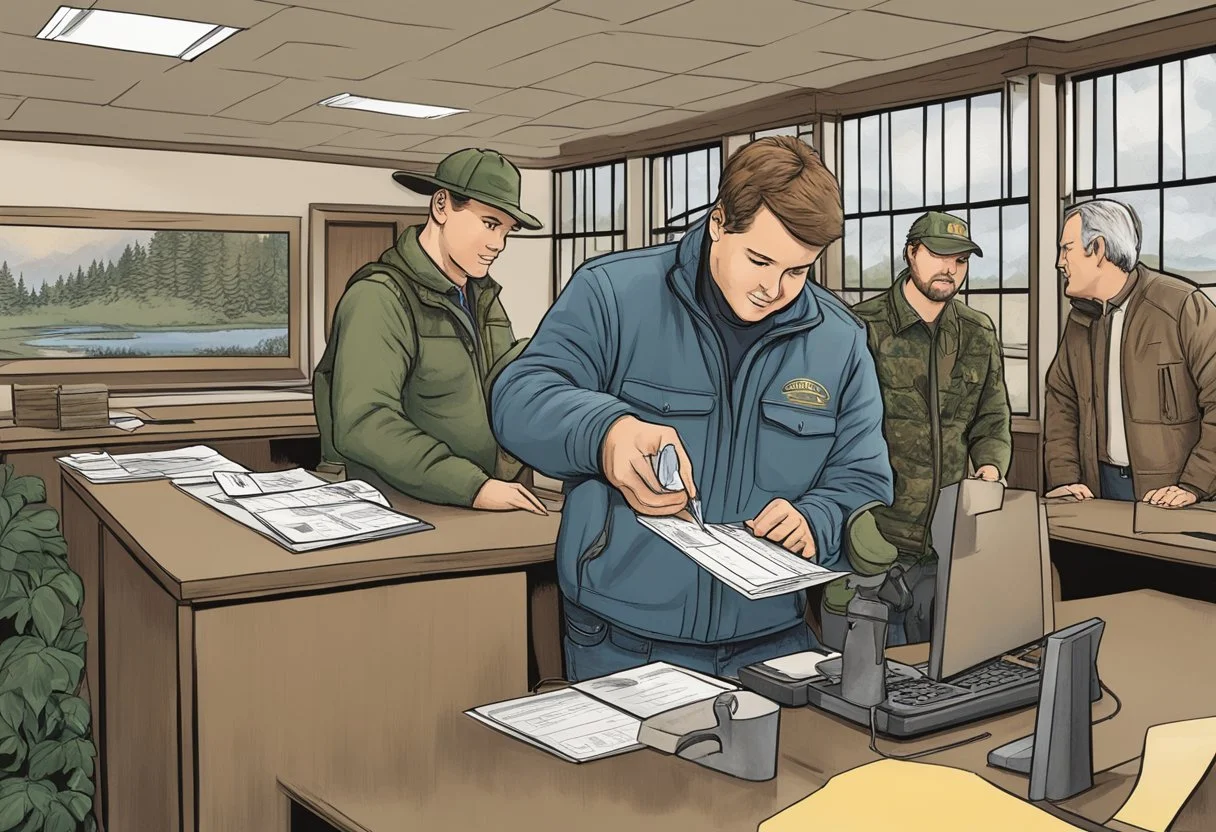How to Get a Wisconsin Non-Resident Hunting License
Your Guide to a Successful Application
This Article is Part of Our Guide to Non Resident Hunting Licenses by State
Wisconsin offers a range of hunting opportunities for non-residents, providing various licenses for those who do not reside in the state but wish to enjoy its abundant wildlife and diverse hunting grounds. These non-resident licenses extend the chance to participate in the state's revered hunting traditions. The Wisconsin Department of Natural Resources (DNR) manages and facilitates the acquisition of these licenses, ensuring that even visitors from outside the state can partake in hunting activities, given that they meet the required regulations and have secured the appropriate permits.
Obtaining a non-resident license in Wisconsin can be accomplished through the Go Wild system, an accessible online service provided by the Wisconsin DNR. This system streamlines the process for purchasing hunting, fishing, and other recreational licenses. Non-resident licenses encompass a variety of options, tailored to fit the needs whether one is visiting for a short hunting trip or attending school in Wisconsin. The DNR also offers licenses to active members of the armed forces who are stationed within the state.
It's important to note that while licenses are valid for the duration of the season defined by the Wisconsin DNR, there are changes in fees for non-resident licenses periodically. These adjustments are part of budgetary decisions and legislation, and they reflect in the cost of licenses available for purchase. Non-resident hunters are advised to stay informed of any fee changes, relevant hunting season dates, and bag limits to ensure compliance with state wildlife management objectives and conservation goals.
Eligibility and Requirements
To hunt in Wisconsin as a non-resident, individuals must meet specific criteria set by the Wisconsin Department of Natural Resources (DNR). These include age-related regulations and mandatory hunter education certification.
Criteria for Non-Resident Applicants
Non-residents seeking hunting privileges in Wisconsin must apply through the Wisconsin DNR. A non-resident is anyone who has not established permanent residence in Wisconsin. First-time buyers may be eligible for certain discounts and should inquire with the DNR about any available offers.
Age-Specific Regulations
Wisconsin mandates distinct regulations based on the age of the hunter. Those under the age of 16 must have a mentor present when hunting, and specific licenses are available for different age groups:
Youth (12-15 years): Can purchase a junior hunting license
Adult (16 years and older): Required to purchase a regular non-resident hunting license
Hunter Education Certification
All hunters born on or after January 1, 1973, must complete a hunter education certification course to buy a hunting license in Wisconsin. Proof of completion or a previous hunting license suffices. Non-residents can sometimes use a certification from their home state as long as it is recognized by Wisconsin.
Types of Non-Resident Licenses
Wisconsin offers a range of non-resident hunting licenses to cater to different species and durations. These licenses ensure that non-residents can legally participate in the state's hunting and fishing activities while contributing to the conservation efforts.
Annual Licenses
Annual licenses serve non-residents who wish to hunt or fish throughout the Wisconsin season. They need to purchase an annual nonresident hunting license for access to hunting multiple species, including deer and small game. For fishing enthusiasts, the annual nonresident fishing license allows them to fish Wisconsin waters for a full year.
Short-Term and Daily Licenses
Non-residents who prefer shorter hunting or fishing trips can opt for short-term or daily licenses. These licenses are convenient for those planning a brief visit or targeting a specific period. For instance, a daily nonresident fishing license can be obtained for those who are in Wisconsin for a short-term stay.
Specialized Hunt Licenses
For individuals interested in specific game, Wisconsin issues specialized hunt licenses. Hunters can purchase a nonresident deer license or a nonresident turkey license, which are specialized for these respective game animals. These licenses are necessary for non-residents who aim to hunt these species during their designated seasons.
Purchasing Process
For non-residents looking to purchase a hunting license in Wisconsin, they have multiple straightforward options available. They can complete their purchase online, at a Department of Natural Resources (DNR) service center, or through authorized sales locations.
Online Purchasing
Non-residents can purchase hunting licenses via the Go Wild system, Wisconsin DNR's official online licensing platform. It is accessible 24 hours a day and offers a user-friendly experience through the following steps:
Visit the Go Wild website.
Create an account or log in to an existing one.
Navigate to the license section.
Select the appropriate non-resident hunting license.
Follow the prompts to complete the transaction.
Print the license or save it on a mobile device.
DNR Service Centers
One can also opt to visit a DNR service center to purchase a non-resident hunting license in person. The staff at these centers are trained to assist with the following:
Providing information on different license types.
Guiding through the application process.
Immediate issuance of the license upon payment.
Note: The locations of these centers can be found on the Wisconsin DNR website.
Authorized Sales Locations
Finally, licenses can also be acquired from authorized sales locations. These are independent businesses authorized by the Wisconsin DNR, typically including:
Sporting goods stores.
Retail shops.
Each location offers in-person assistance to complete the license purchase. However, prices and availability could be subject to change in these stores, so checking with specific locations ahead of time is recommended.
Costs and Contributions
Wisconsin’s non-resident hunting licenses constitute a significant component in funding wildlife management and conservation efforts. Each license fee not only grants access to the state's diverse hunting grounds but also supports ecological sustainability.
License Fees
The fees for non-residents to hunt in Wisconsin have experienced an increase. According to the recent budget, non-residents can expect to see changes in the cost of licenses ranging from $5 to $40. This increment ensures that hunters contribute appropriately to the state’s conservation programs.
Fall Turkey (What wine goes well with turkey?) License: $9.75
Spring Turkey License: $9.75
Sports License: $40.00
Conservation Patron License
The Conservation Patron License is a comprehensive package that offers non-residents various privileges. Priced at $105, it includes hunting, fishing, and trapping licenses, a state waterfowl stamp, and a state trail pass, contributing significantly to the maintenance and enhancement of Wisconsin’s natural recreational areas.
Stamp Requirements
Non-resident hunters must obtain certain stamps along with their licenses to participate in specific types of hunting.
Waterfowl Hunters: Required to purchase a State Waterfowl Stamp for $7.
Federal Duck Stamp: Priced at $25, it is a legal mandate for waterfowl hunting and the proceeds are instrumental in migratory bird conservation.
Optional additions such as the State Trail Pass and Vehicle Admission Sticker promote the upkeep of state trails and parks, providing a complete outdoor experience.
Each stamp and pass represents a dedicated fund to support corresponding wildlife or environmental endeavors, ensuring that hunters' contributions have a direct impact on conservation efforts.
Regulations and Conservation
Wisconsin's hunting regulations are designed to maintain wildlife populations and habitats. The Department of Natural Resources (DNR) sets specific rules for non-resident hunters to ensure sustainable use of the state's natural resources.
Wildlife Management
The Wisconsin DNR is responsible for the careful management of wildlife species to promote biodiversity and ecosystem health. Conservation cards are a part of this initiative, allowing hunters to contribute to conservation efforts. The card ensures that non-resident hunters are aware of and comply with the state's wildlife management strategies.
Seasonal Restrictions
To protect wildlife populations during critical periods of the year, the Wisconsin DNR enforces seasonal hunting restrictions. These restrictions, detailed in the Combined Hunting Regulations, guide hunters on when certain species can be legally hunted. Hunters must adhere to these dates to avoid penalties and to support conservation efforts.
Bag Limits and Harvest Authorizations
For deer hunting, the DNR establishes bag limits to control the number of animals that can be taken, which includes specific provisions for antlerless deer carcass harvest authorizations. These harvest authorizations are crucial for managing deer populations and are subject to change based on annual population assessments. They also serve to balance the deer population with available habitat, reducing the risk of starvation and disease within the herd.
Additional Resources
Wisconsin's Department of Natural Resources provides a variety of resources to assist non-residents with hunting license requirements and purchase processes. These resources ensure that applicants can easily navigate the licensing system and comply with local regulations.
Go Wild Tutorials
The 'Go Wild' system is Wisconsin's portal for managing outdoor recreational licenses. Non-residents can find tutorials on how to use the 'Go Wild' website for purchasing hunting licenses online. These tutorials cover a range of topics, from setting up an account to navigating to the correct license type. The tutorials are designed to facilitate a smooth and efficient online purchase experience.
Customer Service
For additional support, the Wisconsin DNR has a dedicated customer service team. This team is available to address any questions or concerns non-residents might have regarding their hunting licenses. The service team can assist with technical issues, provide clarification on regulations, and help ensure that all transactions are completed successfully.
Sports and Recreational Options
Wisconsin offers a diverse range of licensing options catering to various sports and recreation enthusiasts. These options are thoughtfully designed to accommodate individuals, families, and groups with a passion for the outdoors.
Combination Licensing
In Wisconsin, non-residents can opt for combination licenses, which provide the flexibility to engage in multiple activities without the need to purchase separate permits. A notable choice is the Sport Combo license, allowing holders to fish and hunt small game. These combo licenses are economical and convenient for those who wish to enjoy a breadth of Wisconsin’s outdoor sports.
Family and Group Licensing
For families and groups traveling together, Wisconsin provides Family Annual licenses and Group Recreational licenses. These are tailored to enable several individuals to partake in hunting and fishing activities collectively, often at a reduced cost per participant. Such group-oriented licenses encourage shared experiences, making the most of Wisconsin’s rich natural resources while also promoting responsible wildlife conservation practices.
Special Permits and Applications
Wisconsin offers a range of special permits to non-residents for hunting various wildlife species. These permits often require separate applications and adherence to specific dates and rules.
Sturgeon Spearing
Non-residents who wish to participate in sturgeon spearing must obtain a spearing license. Wisconsin DNR has an annual application period and a cap on licenses. Successful applicants can spear sturgeon during the designated season on specific water bodies.
Turkey and Waterfowl
For spring turkey hunting, non-residents must submit a spring turkey application for a permit through a drawing. Waterfowl hunters are generally required to have a license and may need additional permits or stamps, depending on the zone and season.
Big Game Incl. Bear and Wolf
Non-residents interested in big game hunting, including bear and wolf, need to apply for a permit. The bear application period is open for a limited time each year. Wolves, when they are not protected by federal law, may be harvested by non-residents who secure a wolf harvest application and succeed in the quota-based draw.
Youth and Senior Licensing Options
Wisconsin offers special hunting license options for both non-resident youth and seniors. These licenses are designed to encourage participation in hunting activities, providing discounted rates and specific privileges.
Youth Licenses
Non-resident youth hunters, specifically those aged from 10 to 17, can benefit from licensing at the resident rate if they have a parent who is a resident of Wisconsin. The options include:
Junior Gun Deer License: Allows young hunters to participate in gun deer hunting seasons.
Archer and Crossbow Licenses: Available for youth under 12 years old, permitting them to engage in archery and crossbow hunting under certain regulations.
It's important for non-resident youth to comply with Wisconsin's hunter education requirements before purchasing these licenses.
Senior Discounts and Licenses
Non-resident seniors, those aged 65 and older, can access reduced rates for hunting licenses. The Senior Citizen Small Game License, for instance, provides an opportunity for seniors to engage in small game hunting at a discounted fee. These licenses are a way for seniors to remain active in the hunting community while acknowledging their lifelong contributions to the sport.
Outreach and Education
Wisconsin's Department of Natural Resources (DNR) provides essential resources and educational support to ensure non-residents are well-informed about the state's hunting regulations. These initiatives facilitate a thorough understanding of the legal and safety considerations for hunting in Wisconsin.
Regulatory Guides
The Wisconsin DNR offers comprehensive regulatory guides that detail the necessities for non-resident hunting licenses. These guides are readily accessible through various DNR service centers and the official DNR website. The department ensures that all regulations are up to date, reflecting any changes in legislation or policies.
Available Resources:
Printed regulation booklets at DNR service centers
Online regulatory guides via the DNR's official website
Interactive tools for identifying hunting zones and season dates
Hunting Safety Courses
The DNR places a strong emphasis on hunter safety education. Although a non-resident can obtain a mentored-only hunting license to hunt without first completing a hunter education course, they must be accompanied by an experienced and licensed hunter. The mentor must ensure the mentee hunts within arm's reach and adheres to all other safety and legal requirements.
Safety Education Options:
In-person hunter safety courses offered at various locations statewide
Online safety courses designed for convenience and accessibility
Mandatory mentorship guidelines for those choosing the mentored-only license path
Frequently Asked Questions
What types of non-resident hunting licenses are available in Wisconsin?
Non-residents can choose from several license types offered by the Wisconsin Department of Natural Resources (DNR), including hunting, fishing, and recreational licenses. Availability and purchase options are provided through the Go Wild system or at sales locations.
Are there any fee increases for non-resident hunting licenses?
The Wisconsin DNR occasionally adjusts the fees for licenses. For current fee information, non-residents should refer to the latest data provided by the Wisconsin DNR or the Go Wild system.
How do non-residents purchase a Wisconsin hunting license?
Non-residents may purchase their hunting licenses through the Go Wild online system, any DNR Service Center, or from authorized sales agent locations.
Is there a difference in license fees based on the duration of the license?
Yes, non-residents can expect different fees for different durations. For instance, the Family 15-Day license has its specific fee structure.
Can non-residents acquire a conservation patron or sports license? Yes, non-residents are eligible for various licenses such as the Conservation Patron and Sports License, each with its designated fee, facilitating access to a wide range of hunting and fishing activities.
Are there any special hunting licenses or considerations for non-residents?
While there may be special licenses or considerations occasionally offered by the Wisconsin DNR, non-residents should verify current offerings and requirements by consulting the latest regulations provided through Go Wild or directly via the DNR.
Contact Information
Non-resident individuals seeking a hunting license in Wisconsin can obtain the necessary information and assistance through the Department of Natural Resources (DNR). They should specifically reach out to DNR service centers, which are stationed throughout the state.
DNR Service Centers – Non-Resident License Inquiries:
Non-residents can visit in person or contact a local DNR service center with inquiries about hunting licenses. Each service center has knowledgeable staff ready to assist with the application process and provide details on available licenses.
Phone: To speak directly with a representative for immediate assistance.
Email: For those who prefer to send a detailed inquiry and wait for a response.
In-Person: Individuals can drop by their nearest center for face-to-face communication.
Online Services – 24/7 Access:
The DNR also offers online services for added convenience, where non-residents can find information on hunting seasons, regulations, and purchase licenses.
Go Wild System: A platform providing 24-hour access to licensing and registration.
Online Application Form: Non-residents can apply for a hunting license through an easy-to-use digital form.
Below is a simplified method for non-residents to contact the Wisconsin DNR:
Non-residents stationed in Wisconsin for educational pursuits or military service have unique provisions; they are encouraged to directly contact their nearest DNR service center for tailored information.
Related Opportunities and Activities
In addition to hunting, Wisconsin offers a variety of licensure for non-residents that enable participation in a range of outdoor activities such as trapping and fishing. These activities are regulated to ensure conservation efforts while providing ample recreational opportunities.
Trapping and Collecting
Non-resident trappers in Wisconsin can pursue various species, adhering to state regulations to maintain ecological balance. Trapping licenses are essential for catching fur-bearing animals, with separate permits necessary for species like bobcat, fisher, and otter. For those interested in more unique forms of collecting, a Ginseng Harvester license is available for those looking to gather this prized root following specific harvest seasons and guidelines.
Fishing and Angling
Wisconsin's diverse freshwater systems offer ample fishing and angling opportunities. Non-residents can acquire licenses for a single day or annually to fish Wisconsin's lakes, rivers, and streams. These licenses cover a range of species, from panfish to muskellunge. There are also resident fishing licenses, but these are specifically tailored to those who live within the state year-round.
Other Outdoor Licenses
For enthusiasts of the outdoors, Wisconsin provides additional licensing options that go beyond trapping and fishing. Non-residents may purchase collector stamps, which, while not a license themselves, often contribute to conservation efforts and can be required along with specific licenses. These stamps and their associated licenses enable participation in Wisconsin’s heritage of nature conservation and outdoor recreation.
#WisconsinHuntingLicense #NonResidentHunting #OutofStateHunting #HuntingPermits #WildlifeConservation #OutdoorAdventures #HuntingRegulations


